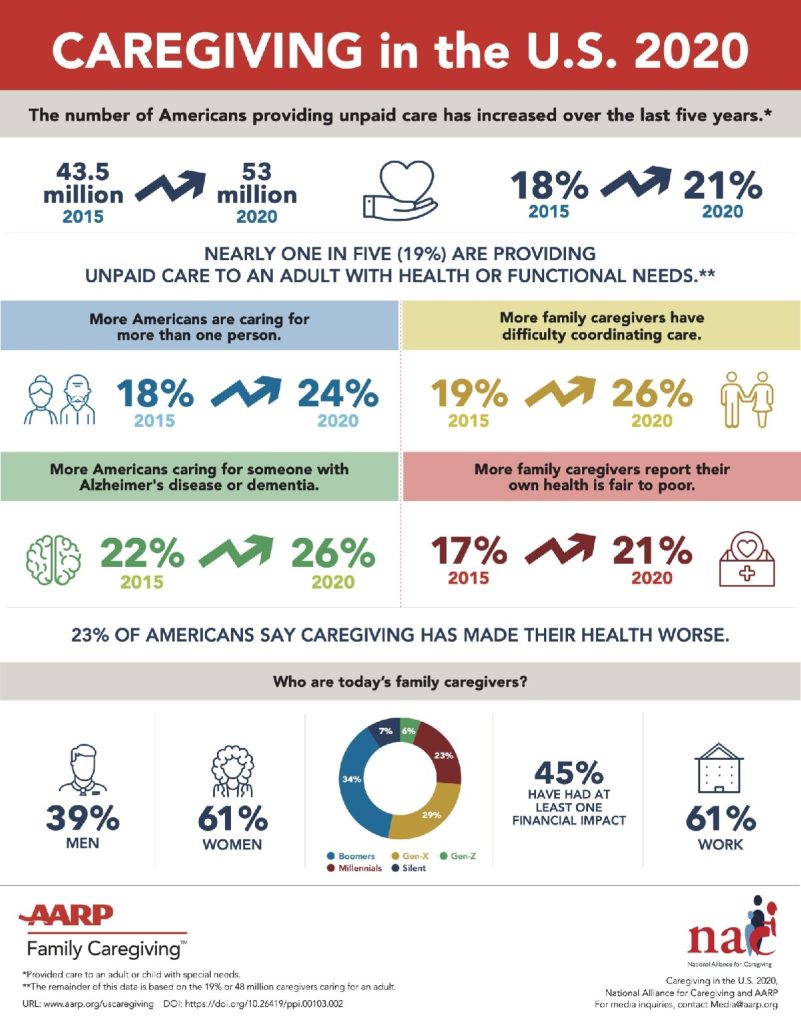As family caregivers manage the weight of helping an infirm or elderly family member, they often gain weight, feel depressed and anxious, and sleep poorly. The longer they are in the role, the more likely caregivers are to exhibit symptoms, so finding alternative ways of coping is key.
Unpaid caregiving means providing informal care and assistance to individuals who can’t independently perform activities of daily living. It’s a big task being fulfilled by around 53 million US adults, per a 2020 report from the AARP and the National Alliance of Caregiving. About 19% of them are particularly caring for an aging loved one (50 years or older), including elderly parents.
What Are The Burdens Faced By Family Caregivers?
While certainly fulfilling, the role that family caregivers play come with a price. Below, we list the burdens carried by family members caring for an ailing and aging loved one.
Decreased Immune Function
Caregiver health is considered a public health priority. One big reason is that they are more likely to have compromised immune function, which leads to an increased risk of developing illnesses such as heart disease.
More than 50% of caregivers who reported health concerns also said their declining health status has negatively affected their ability to perform caregiving tasks.

Mental Exhaustion
Informal caregiving doesn’t only impact one’s physical well-being. It can take a toll on caregivers’ mental health, causing them to experience depression, anxiety, and subclinical stress. About 40 to 70% of family caregivers display depressive symptoms.
Negative emotions, including sadness, isolation, guilt, dread, and anticipatory grief can overcome unpaid caregivers. Them working a thankless job and not getting the necessary validation can further worsen their mental drain.
Sleep Deprivation
Looking after someone with a chronic disease such as Alzheimer’s disease is a duty that demands a lot of time and attention. If a caregiver experiences a lack of sleep, it can aggravate their physical and mental stress.


Lack Of Time And Privacy To Do Other Things
Informal caregivers from any ethnicity dedicate most of their time to assisting other people. They could also juggle providing home care with other personal responsibilities, such as work and being a breadwinner of their own family.
This takes away their time to do other things — for instance, engage in physical activity, being more conscious how they prepare their food servings, or going to doctor follow-ups. Being constantly with their “patients” can also make them feel like they don’t have a personal space anymore.
Financial Stress
Caregiving is inevitably expensive. Apart from the healthcare-related costs, an informal caregiver also has to deal with other financial issues, such as lost wages and missed career growth opportunities while taking care of their loved ones.

What Types Of Caregivers Tend To Gain Weight?
Informal caregivers who look after older adults — or any other individual who needs assistance with everyday tasks and round-the-clock care — are subject to weight gain. They often don’t have the luxury of time to maintain a healthy lifestyle. They may also not have an adequate support system that can offer them practical and moral support facing their own physical and mental health issues.
The lack of exercise, unhealthy diet, and stress can cause them to struggle to keep a healthy weight.
What Is The Relationship Between Caregiving And Weight?
It’s understandable for family caregivers to feel overwhelmed by their caregiving responsibilities. And one way that they cope is through emotional eating.
When their stress hormone cortisol increases, their insulin levels also shoot up. This situation prompts a fight-or-flight response. After it subsides, the blood sugar level in their body decreases, causing them to crave sugar-laden meals, snacks, and beverages.
They also tend to retain calories mainly because they don’t have time to burn them through exercise. All this leads to informal caregivers’ weight gain and a higher body mass index. BMI is a measure of body fat based on height and body weight.

Why Do Caregivers Often Gain Weight?
While family caregivers play a vital role in taking care of their frail and vulnerable loved ones, 26% of this demographic have worse health than non-caregiver counterparts. About 64% of caregivers are hypertensive, 50% struggle with obesity, 37% suffer from depression, and 34% battle anxiety.
Among other predictors, stress shows strong correlations with weight gain and obesity. High cortisol levels, unhealthy stress-prompted behaviors, or both can lead to obesity.
Unpaid caregivers are people who live in a highly stressful environment. Their stress can be attributed to doing additional responsibilities, not getting enough sleep, and dealing with personality or behavioral changes that their ailing family members and loved ones exhibit.
Their distress and fatigue also tend to worsen over time. According to a survey (wherein the questionnaire was handed out to 4,800 respondents during the early stages of the COVID-19 pandemic), long-term caregivers experienced more body aches, headaches, and abdominal issues.
What Are The Consequences Of Family Caregiver’s Weight Gain?
Obesity is a pressing concern among family caregivers. These are some consequences they face from gaining too much weight.
- Higher blood pressure. When a body has more fat tissue, it undergoes changes that can create or escalate hypertension. Conversely, weight loss can lead to lower blood pressure.
- Increased risk of diabetes. Obesity is considered the no. 1 risk factor for type 2 diabetes. Over time, diabetic people also develop other healthcare issues (e.g., stroke, kidney disease).
- Decreased mobility. Excessive fat can strain muscles and bones, impairing an obese individual’s range of motion, balance, and flexibility.
- Discrimination. Society views being fat in a negative light. A caregiver who becomes obese can suffer from embarrassment and body image dissatisfaction. This can further lead to depression.
- Lower quality of life. Carrying extra weight can make it difficult for caretakers to perform certain tasks themselves. The physical consequence of obesity — paired with the emotional exhaustion that comes with it — decreases their quality of life.

What Is Caregiver Overload?
When caregivers become physically, emotionally, and mentally drained, they experience caregiver overload. It’s a state more common among women and caretakers who spend more days giving care and have depressive symptoms.
People who have caregiver burnout show the following signs:
- Frequent colds and illnesses
- Irritability
- Anger (directed at the person being cared for, themselves, and other family members)
- Insomnia
- Loss of appetite
- Social withdrawal
- Excessive smoking and alcohol intake
How Can Caretakers Lighten Their Burden Through Self-Care?
Caregivers need care, too. And while caregiver overload and weight gain is prevalent, these issues can be prevented or better managed. Here are self-care tips caretakers must know:
Set Realistic Goals
Caregiving is an arduous task. If you’re an informal caregiver, you have to handle it smartly. Identify your priorities, write down to-do lists, and set up a routine.
Enlist Help From Others
Home care professionals and respite care centers are there to lighten your caregiving load. You should also be more honest with family members and proactively seek their help — practically and emotionally.
Eat And Drink More Healthily
Be mindful of your weight status and put effort into planning your meals. Ditch junk and processed foods and beverages and opt for more veggies. For your snacks, your healthy options include nuts, fruits (including dried ones), and snack bars.
Incorporate Exercising Into Your Schedule
A balanced diet isn’t enough for you to achieve your weight loss goals. Set aside time for aerobic, strength training, stretching, and balance exercises. For instance, if you’re caring for an older loved one, you can join them during their exercise routines.
Consider Joining A Support Group
Whether in New York, California, or other parts of the country, taking part in a support group is a healthy way of coping with caregiver burnout. It’s an avenue where you can have validation and learn from others’ real-life experiences.

